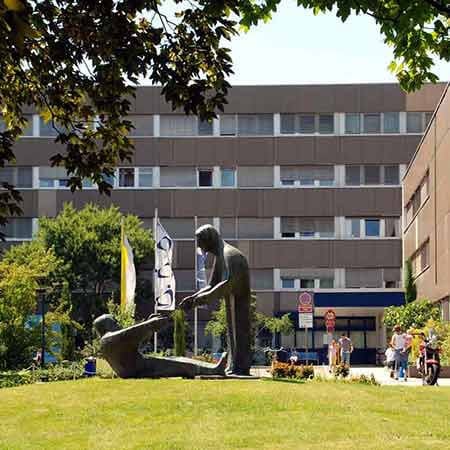Colon cancer
Colon cancer is a pathological process that is characterized by the malformation growth from the mucous membrane of the large intestine.
The Booking Health portal presents 97 German clinics specializing in colon cancer treatment
Show all clinics
Possible locations of the tumor are:
- The sigmoid colon – 50%
- Cecum – 15%
- Ascending colon – 12%
- Transverse colon – 5%
- Descending colon – 5%
- Right colic flexure – 8%
- Left colic flexure – 5%
This disease is one of the most common types of the malignant formations. The incidence of colon cancer is 15-20 cases per 100 thousands of population a year. The highest incidence is observed in the USA and Western European countries.
Colon cancer – Diagnostics
If colon cancer is suspected, the following methods can help to confirm the diagnosis:
X-ray examination. The contrasting medium is injected into the intestine. Then an X-ray image (irrigography) can be taken or the doctor examines the intestine in real time (irrigoscopy). The most informative is an examination with double contrast, when, after a bowel movement from the barium mixture, the air is introduced there.
With the help of the irrigography the following things can be determined:
- Size and location of the tumor
- The degree of narrowing of the intestine
- Presence of ulcerations in the tumor
Colonoscopy is an endoscopic method of the diagnostics connected with an instrument insertion into the colon through the rectum. It allows to take the biopsy for histological examination.
The following methods are used to determine extent of the pathological process and detect metastases:
- Ultrasound examination
- Laparoscopy
- Computed tomography
- Aspirational fine-needle biopsy of the liver (the most common spot of detecting the metastases of colon cancer)
Best clinics for the colon cancer diagnostics in Germany:
Colon cancer – Treatment
Surgery is the main treatment method in the case of bowel cancer. Operations are performed, during which affected by the tumor organ, the mesentery and lymph nodes are removed.
During germination of the tumor into nearby tissue an extended resection of the bowel is performed. It presupposes the removal of the small intestine areas, bladder, liver or other organs, depending on the clinical situation.
Auxiliary treatment methods are:
- Chemotherapy and radiation therapy. Drugs and distant irradiation are indicated as an addition to radical surgery.
- Hyperthermic intraperitoneal chemotherapy. During surgery, the abdomen is rinsed with a chemotherapy solution that is heated up to 42 degrees. This procedure reduces the risk of relapse by eliminating micrometastases and tumor remnants.
- Embolization of hepatic arterial branches is used in the case of liver metastases and helps to reduce the blood access to the malformation, slowing its growth.
Treatment costs in specialized German cancer centers are as follows:
- The cost of da Vinci surgery for colon cancer ranges between 20,400 EUR and 40,700 EUR.
- The cost of chemotherapy for colon cancer ranges between 6,950 EUR and 12,100 EUR.
- The cost of cytoreductive surgery and HIPEC for colon cancer ranges between 51,900 EUR and 92,400 EUR.
Colon cancer – Innovative treatment
Medical science does not stand still. New methods of cancer treatment are constantly being developed, the surgical and conservative ones. In recent years the following technologies and medications have appeared, such as:
- Laparoscopic bowel resection has the same efficiency as a conventional operation, but it is characterized by a much less traumatization of the patient's tissue. The intervention is performed through several small incisions, which significantly reduces and simplifies the postoperative period.
- Robot-associated operations. The usage of robotics allows to perform the surgical interventions much more accurately. As a result, the mortality of patients during surgery and the risk of postoperative complications are reduced.
- New methods of the immunotherapy. The vaccine against colon cancer is being researched and will be soon available for the practical application. It will be injected after surgical treatment in order to prolong remission and reduce the risk of relapse. Also, new drugs, inhibitors of control points, have appeared. They inhibit the signalling molecules that protect cancer cells from destruction by the human immune system.
Treatment of stage 4 colon cancer
Surgery remains the best treatment option, even for stage 4 colon cancer. It ensures the long-term survival of patients. Doctors may perform the following surgical interventions:
- Combined operations: surgical treatment of stage 4 colon cancer with metastases involves simultaneous or sequential removal of a part of the intestine with the primary tumor and a part of the organ in which the metastases are located (most often the liver and less often the lung or brain).
- Cytoreductive surgery is a treatment option for stage 4 cancer that has spread throughout the peritoneum. Doctors remove all visible tumor foci. The abdominal cavity is then rinsed with a heated solution of cytostatics to destroy the remaining cancer cells.
When providing treatment of stage 4 colon cancer, doctors can also remove the primary tumor with surgery and then control the remaining tumors using other procedures. For example, bowel resection may be complemented by hepatic artery chemoembolization or stereotactic radiotherapy for brain metastases.
Patients with end-stage cancer undergoing treatment abroad receive modern systemic therapy. It includes not only chemotherapy drugs but also targeted therapy with VEGF, EGFR, BRAF, HER2, and TRK inhibitors, multikinase inhibitors, and immunotherapy with PD-1 and CTLA-4 inhibitors.
Dendritic cells for colon cancer
One of the options for immunotherapy for colorectal cancer is dendritic cell therapy. Dendritic cells (DCs) are needed to disassemble antigens into fragments and present them to T cells in parts because T cells cannot recognize whole antigens. The principle of therapy is based on the fact that monocytes are taken from human blood, some substances are added for their maturation into DCs, they are treated with tumor antigens, and they are injected into the body. Following vaccination for colon cancer, the immune system's response is enhanced.
Typically, colon cancer treatment with dendritic cells is used at an advanced stage, and vaccination after surgery is also possible. These treatments are currently considered experimental, with dozens of dendritic cell-based vaccines currently in clinical trials.
We also recommend that you watch the video on our YouTube channel "Booking Health", where the leading specialists of the specialized clinic talk about the advantages and peculiarities of dendritic cell therapy.
Best clinics for the colon cancer treatment in Germany:


Colon cancer – Rehabilitation
Most patients require rehabilitation after the treatment of complex oncological diseases. It includes the following aspects:
- Prevention of complications that may occur as a result of treatment. It can be pneumonia, lymphostasis, thromboembolic or infectious complications.
- Restoration of general health. The elimination of the consequences after surgeries and chemotherapy is carried out. The functions of internal organs are restored with the help of various medical and rehabilitation measures.
- Restoration of occupation. A person must not just stay alive. He must have physical and intellectual capabilities, which are sufficient for employment.
- Psychological support. First of all, it is required for patients, whose occupational performance was harmed because of the disease. Patients with deterioration of appearance also will benefit from psychological help.
- Restoration of appearance. If necessary, you can use surgical and other methods in Germany to restore appearance defects caused by cancer. For example, to carry out the reconstruction of the breast.
- Social and domestic rehabilitation. A person with reduced workability is trained to act in the society and perform everyday tasks in new conditions.
In German clinics, rehabilitation is carried out in a comprehensive manner. The patients are provided with qualitative care here. Doctors' monitoring and conservative treatment allow to avoid complications, which usually happen after treatment of oncological diseases. Psychotherapy, physiotherapy and physical therapy are actively used in Germany.
Specialists in different medical spheres take part in the rehabilitation process. These are massage therapists, speech therapists, specialists in physiotherapy exercises, physiotherapists. Social and occupational therapy is carried out, as well. If necessary, people are taught how to eat properly, take care of a colostomy, etc.
In Germany, rehabilitation is carried out with the maximum level of comfort for the patient. A person feels the results quite quickly and it improves his motivation and promotes further recovery.
Best clinics for oncological rehabilitation in Germany:
Author:
The article was edited by medical expert, board certified Dr. Nadezhda Ivanisova. For the treatment of the conditions referred to in the article you must consult a doctor; the information in the article is not intended for self-medication!
Source:
National Center for Biotechnology
Cancer Treatment Centers of America
The cost of services includes
Here you can find the cost of treatment for this disease at the German University Hospitals. Leave a request and we will provide a free consultation with a doctor and will start organizing the whole treatment process.
The program includes the following:
- Issuing of an invitation for getting a visa for treatment as quick as possible
- Fixing an appointment at a time convenient for you
- Preliminary organization of a comprehensive examination and discussion of the forthcoming treatment plan
- Arranging transfer from the airport to the hospital and back to the airport
- Provision of interpreting services and services of a personal medical coordinator
- If necessary, assistance in the organization of further surgical treatment
- Provision of a medical insurance against treatment complications covering up to 200,000 euro
- Preparation and translation of medical records and recommendations from the hospital
- Assistance in the subsequent communication with your attending physician, including consultations on repeated X-ray images through the unique medical document management system E-doc




